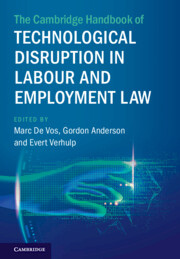Book contents
- The Cambridge Handbook of Technological Disruption in Labour and Employment Law
- The Cambridge Handbook of Technological Disruption in Labour and Employment Law
- Copyright page
- Contents
- Figures
- Tables
- Contributors
- 1 Technology and Law for the Future of Work We Want
- 2 The International Labour Organisation and the Future of Work
- 3 The Digitalisation of Work and the EU: Jurisprudential and Regulatory Responses in the Labour and Social Field
- 4 The Impact of Technological Disruption on German Labour Law: Risks and Opportunities
- 5 Austria: The Corporatist Perspective on Technological Disruption
- 6 Technological Disruption in Employment and Labour Law in the Netherlands
- 7 The Digitalisation of Labour Law in France
- 8 Italian Labour Law: Trends and Developments Put to the Test of Technological Disruption
- 9 Spain: Towards a New Architecture for Labour Law Institutions
- 10 Technological Developments and Industrial Relations in Denmark
- 11 Poland: Old and New Legal Concepts in the Changing World of Work
- 12 Technological Disruption and the Evolution of Labour Law in Hungary
- 13 Digitalisation and Disruption of Labour Relations in Estonia
- 14 Israel: New Trends in Israeli Labour and Employment Law
- 15 United Kingdom: Labour Law and Technological Authoritarianism at Work: Past, Present, and Future
- 16 Old Problems and New Technologies in the American Workplace
- 17 Australia: Reimagining the Regulation of Work
- 18 Technological Disruption and the Future of Work in Aotearoa/New Zealand
- 19 Technological Disruptions in Labour and Employment Law: South Africa
- 20 Japan: Labour Law and Policy in an Era of Technological Innovation
- 21 The Republic of Korea: Old Regulations and New Challenges in the World of Work
- 22 Technological Disruption and Labour Law: Between Utopia and Dystopia
22 - Technological Disruption and Labour Law: Between Utopia and Dystopia
Published online by Cambridge University Press: 07 December 2023
- The Cambridge Handbook of Technological Disruption in Labour and Employment Law
- The Cambridge Handbook of Technological Disruption in Labour and Employment Law
- Copyright page
- Contents
- Figures
- Tables
- Contributors
- 1 Technology and Law for the Future of Work We Want
- 2 The International Labour Organisation and the Future of Work
- 3 The Digitalisation of Work and the EU: Jurisprudential and Regulatory Responses in the Labour and Social Field
- 4 The Impact of Technological Disruption on German Labour Law: Risks and Opportunities
- 5 Austria: The Corporatist Perspective on Technological Disruption
- 6 Technological Disruption in Employment and Labour Law in the Netherlands
- 7 The Digitalisation of Labour Law in France
- 8 Italian Labour Law: Trends and Developments Put to the Test of Technological Disruption
- 9 Spain: Towards a New Architecture for Labour Law Institutions
- 10 Technological Developments and Industrial Relations in Denmark
- 11 Poland: Old and New Legal Concepts in the Changing World of Work
- 12 Technological Disruption and the Evolution of Labour Law in Hungary
- 13 Digitalisation and Disruption of Labour Relations in Estonia
- 14 Israel: New Trends in Israeli Labour and Employment Law
- 15 United Kingdom: Labour Law and Technological Authoritarianism at Work: Past, Present, and Future
- 16 Old Problems and New Technologies in the American Workplace
- 17 Australia: Reimagining the Regulation of Work
- 18 Technological Disruption and the Future of Work in Aotearoa/New Zealand
- 19 Technological Disruptions in Labour and Employment Law: South Africa
- 20 Japan: Labour Law and Policy in an Era of Technological Innovation
- 21 The Republic of Korea: Old Regulations and New Challenges in the World of Work
- 22 Technological Disruption and Labour Law: Between Utopia and Dystopia
Summary
The collection offered in this book is a kaleidoscopic exercise in contrast. Contrast between the promises and pitfalls of technological innovation that often reach a degree of hype in the public discourse, on the one hand, and the speed and breadth of law reform, on the other. Between the varying legal traditions of regions and countries in dealing, through labour and employment law, with what has been a historical constant of modernity: adjusting and responding to technological change. Between regimes more favourable to embracing technological innovation through evolving labour organisation and/or regulation, and regimes more favourable to restricting technology by old or new labour organisation and regulation. Between countries where the pace of legal progress is set primarily through courts and cases in a typically incremental, organic, and occasionally transformational fashion, and countries where the statute book sets the tone in a typically categorical fashion.
Keywords
- Type
- Chapter
- Information
- Publisher: Cambridge University PressPrint publication year: 2023

